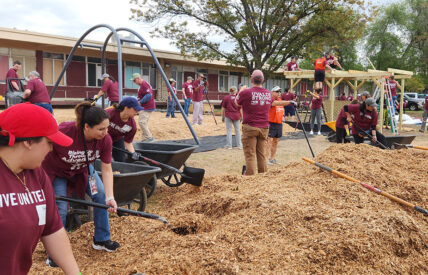
Everyone deserves to feel safe. But the statistics tell a different story.
- Every 73 seconds another American is sexually assaulted.
- One out of every six American women has been the victim of an attempted or completed rape in her lifetime.2
- 1 out of every 33 American men has been the victim of an attempted or completed rape in his lifetime.3
- In Texas, 6.3 million (4.2 million women and 2.1 million men) or 33.2% of adult Texans have experienced some form of sexual assault in their lifetime.4
- 94% of female survivors experience symptoms of post-traumatic stress disorder (PTSD) during the two weeks following the rape.3
- 33% of women who are raped contemplate suicide.3
- 13% of women who are raped attempt suicide.3
The Rape Crisis Center, RCC, a United Way community impact partner, shares a story that illustrates the importance of their services and, specifically, offering online chat services for youth who may be more comfortable disclosing sensitive information through this method of communication.
During her Sunday night shift, one of the Crisis Intervention Specialists responded to an online chat message from 15-year-old, “Eliza,” who reported being sexually assaulted by her father.
While providing emotional support, the intervention specialist engaged in building rapport with the survivor, resulting in her getting the survivor’s name and address. While still chatting, the staff member was able to contact the Texas Department of Family and Protective Services (DFPS) and law enforcement.
Eliza was very afraid and doubted that she would be protected from her father. The Rape Crisis Center call specialist addressed all her concerns and informed her of what to expect when law enforcement arrived.
The next day, during her off hours, the crisis intervention call specialist followed up with the police department to learn that an arrest was made.
This part-time Rape Crisis Center staff member, one of many who help to keep the nonprofit’s services available overnight and 24/7, proved that her commitment to clients and the community extend beyond her weekly work shift.
RCC free services include: prevention education, counseling, 24-hour crisis hotline and live chat, and advocacy service that include case management and hospital accompaniment. Those seeking crisis support will be treated with care and compassion and may reach out to the Rape Crisis Call Center at (210) 349-7273 or through online chat. Another helpful resource is the United Way 2-1-1 Helpline, which also offers phone or chat options.
Additionally, the Rape Crisis Call Center recently implemented a new client service database that integrates information from all Rape Crisis Center programs. When new or continuing clients call the hotline and provide their name, the database will now attach the call log to the client’s record. The hotline staff member can review a caller’s history with the agency, and other service providers are able to see any concerns that came up during a hotline call. This database greatly improves the coordination of care and helps facilitate internal referrals to the advocacy and counseling programs.
United Way partners with the Rape Crisis Center through collaborative work supporting the Safety Net Impact Council and the Strong Individuals and Families Impact Council. Through this dynamic partnership with RCC, we focus on prevention education to end sexual violence in our community and provide support to help everyone feel safe and reach their full potential.
- Source: Department of Justice, Office of Justice Programs, Bureau of Justice Statistics, National Crime Victimization Survey, 2018 (2019). Note: RAINN applies a 5-year rolling average to adjust for changes in the year-to-year NCVS survey data
- Source: National Institute of Justice & Centers for Disease Control & Prevention, Prevalence, Incidence and Consequences of Violence Against Women Survey (1998)
- Source: https://rapecrisis.com/statistics/
- Source: https://rapecrisis.com/wp-content/uploads/2015/09/TX-SA-Prevalence-Study-Final-Report-4-2015.pdf
|
Categories: Uncategorized |







